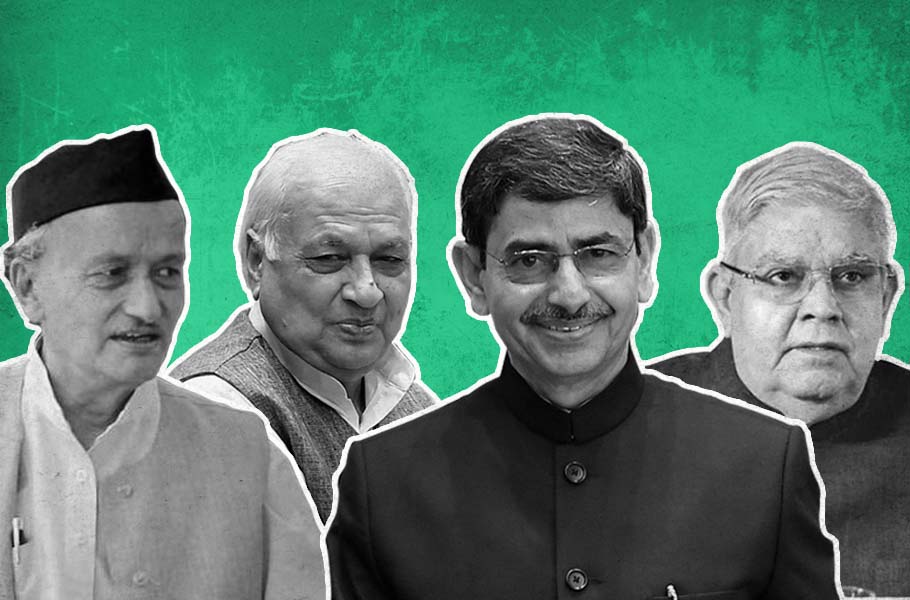
The Federal webinar: Should post of Governor be scrapped?
Discussing the issue are T K S Elangovan, member of the Rajya Sabha, DMK; M B Rajesh, Speaker of the Kerala Legislative Assembly; P D T Achary, former secretary general, Lok Sabha; Gargi Chatterjee, head, Bangla Pokkho, Kolkata; and Tathagata Roy, former governor and BJP leader, Kolkata. The talk is moderated by S Srinivasan, editor-in-chief, The Federal

The credibility of Governors has hit a nadir in present day India. The deterioration started several years ago. Today, Governors are seen as the agents of the central government rather than independent Constitutional functionaries.
The Federal on Saturday February 20 hosted a webinar to discuss this critical issue. It was attended by experts including political leaders from Kerala and Tamil Nadu – two states that have demanded the abolition of the post – a former Governor, and a constitutional authority. The webinar was moderated by S Srinivasan, editor-in-chief, The Federal.

In their opening statements, M B Rajesh, speaker of the Kerala Legislative Assembly, T K S Elangovan, member of the Rajya Sabha, DMK, and Gargi Chatterjee, head, Bangla Pokkho, which focuses on Bengali rights in the Indian Union, said Governors were a relic of the past, when India was still a British colony.
Rajesh said a number of states have witnessed, and are witnessing on a day-to-day basis, conflict between Governors and elected state governments.
The speaker said though these conflicts have increased in the recent past, this is not an entirely new trend – “right from the dismissal of the democratically elected communist government headed by Comrade E M S Namboodiripad in Kerala to the recent developments in Bengal, Maharashtra and elsewhere.”
Rajesh said this “unending conflict” between the Centre and the States has its roots in “colonial origins of the office of Governor”.
“The Constituency Assembly retained the post of Governor from the pre-Independent Government of India Act of 1935. The purpose of the post in the 1935 Act, which established provincial assemblies, was to ensure that the overriding power remained with the British.”
The Constituent Assembly not only chose to retain the colonial legacy of having an appointed Governor but also vested it with discretionary powers, he said. In the new Constitution Articles dealing with the powers of the Governor were almost verbatim reproduction of the 1935 Act, he said. Concerns of other members of the Constituent Assembly were brushed aside on two grounds – dearth of competent legislators and certain amount of centralisation was necessary in a nascent state, he added.
Both Elangovan and Chatterjee then offered similar arguments, calling for the post of Governor to be abolished. Chatterjee said Bengal had suffered the most from British rule and India’s decision to retain the Governor’s post implied that, as during colonial times, “natives” could not be trusted to make the right decision.
P D T Achary, former secretary general, Lok Sabha, said that at no time has any central government given serious thought to abolishing the Governor’s office. Dr B R Ambedkar, who drafted the Constitution, was not only in favour of retaining the Governor’s post, but he was also in favour of giving certain discretionary powers to the Governor. “He felt that in India a post of Governor should be there. The post, he felt, was necessary because of the peculiar situation that was then prevailing in India. And the states are in a subordinate position so far ass the Union is concerned,” Achary said. “It is in the interest of the Union to keep the states under come control.”
One way to resolve this issue would be to not appoint politicians as Governors. Instead eminent personalities should be sent to Raj Bhavan, he said.
Tathagata Roy, former Governor of Tripura and Meghalaya, spoke against the motion. “The Constituent Assembly brought about a lot of departure from the 1935 Act will retaining the post of Governor,” he said.
Roy also directly challenged Chatterjee’s argument, comparing State-Centre relations to one between “natives” and “colony”. “I am rather disturbed by the manner in which he has compared States to ‘natives’ and the Centre to the British,” he said.
Watch the full webinar above.


